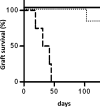The effects of brain death and ischemia on tolerance induction are organ-specific
- PMID: 29377632
- PMCID: PMC5910264
- DOI: 10.1111/ajt.14674
The effects of brain death and ischemia on tolerance induction are organ-specific
Abstract
We have previously shown that 12 days of high-dose calcineurin inhibition induced tolerance in MHC inbred miniature swine receiving MHC-mismatched lung, kidney, or co-transplanted heart/kidney allografts. However, if lung grafts were procured from donation after brain death (DBD), and transplanted alone, they were rejected within 19-45 days. Here, we investigated whether donor brain death with or without allograft ischemia would also prevent tolerance induction in kidney or heart/kidney recipients. Four kidney recipients treated with 12 days of calcineurin inhibition received organs from donors rendered brain dead for 4 hours. Six heart/kidney recipients also treated with calcineurin inhibition received organs from donors rendered brain dead for 4 hours, 8 hours, or 4 hours with 4 additional hours of cold storage. In contrast to lung allograft recipients, all isolated kidney or heart/kidney recipients that received organs from DBD donors achieved long-term survival (>100 days) without histologic evidence of rejection. Proinflammatory cytokine gene expression was upregulated in lungs and hearts, but not kidney allografts, after brain death. These data suggest that the deleterious effects of brain death and ischemia on tolerance induction are organ-specific, which has implications for the application of tolerance to clinical transplantation.
Keywords: animal models: porcine; heart transplantation/cardiology; kidney transplantation/nephrology; lung transplantation/pulmonology; rejection; tolerance: experimental; translational research/science.
© 2018 The American Society of Transplantation and the American Society of Transplant Surgeons.
Conflict of interest statement
The authors of this manuscript have no conflicts of interest to disclose as described by the
Figures



References
-
- Floerchinger B, Oberhuber R, Tullius SG. Effects of brain death on organ quality and transplant outcome. Transplant Rev (Orlando) 2012;26(2):54–9. - PubMed
-
- Utsugi R, Barth RN, Lee RS, Kitamura H, LaMattina JC, Ambroz J, et al. Induction of transplantation tolerance with a short course of tacrolimus (FK506): I. Rapid and stable tolerance to two-haplotype fully mhc-mismatched kidney allografts in miniature swine. Transplantation. 2001;71(10):1368–79. - PubMed
Publication types
MeSH terms
Substances
Grants and funding
LinkOut - more resources
Full Text Sources
Other Literature Sources
Medical
Research Materials

